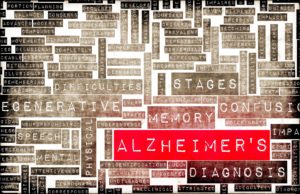What Are the Early Signs of Alzheimer’s? [Part 2]

How do you track the early signs of Alzheimer’s?
Noticing the early signs of Alzheimer’s is important to keeping track of your health and monitoring how fast the disease develops. If you don’t know what the early signs of Alzheimer’s and dementia are, here is a list of symptoms that are most common in individuals.
5 Early Symptoms of Alzheimer’s and Dementia
- New Problems with Words in Speaking and Writing
Those experiencing early symptoms of Alzheimer’s and dementia may have trouble participating in conversations. Whether they are speaking or writing, individuals may find it difficult to come up with the right words and may call common items by a different name; they may also repeat themselves or stop speaking in the middle of a sentence or story and not know how to continue.
- Misplacing Items and Losing the Ability to Retrace Steps
A common symptom of Alzheimer’s is losing items and leaving them in unusual places. When they cannot find their belongings, they may begin to accuse people of stealing and become untrusting.
- Decreased or Poor Judgement
One of the biggest problems in those with Alzheimer’s is their ability to make sound judgements and decisions. Many may begin to give large amounts of money to telemarketers or organizations and lose track of their accounts and budget. Personal grooming habits also fall by the wayside.
- Withdrawal of Work or Social Activities
Though they may not know what is happening, the beginning stages of Alzheimer’s may cause people to withdraw from work or social events because of the changes they are feeling. People may have no interest in family time or hobbies, even though they used to love those activities.
- Changes in Mood and Personality
The changes in mood and personality of a person experiencing dementia and Alzheimer’s may happen quickly and drastically. They may become suspicious, depressed, anxious and confused. Their comfort zone may shrink and can have extreme reactions with people they know and in places they are familiar with.
Though there is currently no cure for Alzheimer’s or dementia, getting a handle on the disease early can make the symptoms easier to handle manage. Watch out for these common signs to monitor the decline of you or someone you know. Start by tracking and monitoring memory with a free MemTrax test today!
About MemTrax
MemTrax is a screening test for the detection of learning and short-term memory issues, particularly the type of memory problems that arise with aging, Mild Cognitive Impairment (MCI), dementia and Alzheimer’s disease. MemTrax was founded by Dr. Wes Ashford, who has been developing the memory testing science behind MemTrax since 1985. Dr. Ashford graduated from the University of California, Berkeley in 1970. At UCLA (1970 – 1985), he attained an M.D. (1974) and Ph.D. (1984). He trained in psychiatry (1975 – 1979) and was a founding member of the Neurobehavior Clinic and the first Chief Resident and Associate Director (1979 – 1980) on the Geriatric Psychiatry in-patient unit. The MemTrax test is quick, easy and can be administered on the MemTrax website in less than three minutes. www.memtrax.com
